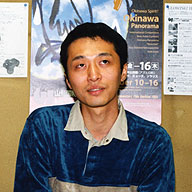An Interview with Oki Masaharu
Being a Liar Is a Filmmaker’s Beginning
Q: Why did you decide to make this work?
OM: This was my graduation piece for college, but as a third-year student I’d performed in a piece that I shot, and I wanted to perform again. Some people make works wanting to convey the truth, but for me, I make works wanting to tell lies. When I perform it seems like the truth, and precisely because of this, I think maybe I can tell interesting lies. So if that can be called a reason, there it is. I do the filming almost entirely on my own. For this film there wasn’t really a script, and while shooting I was thinking about what I wanted to shoot next.
Q: Watching the piece there were a lot of interesting parts. First, who exactly is the “you” that you’re talking to from the beginning of the piece?

OM: I feel like maybe I had a specific person in mind when I first thought of the phrase “It’s been three years since I met you…” But it changed as I shot. It’s the part asking you to imagine different things, not wanting to limit things too much. Some people said wasn’t it the instructor for the seminar class at school, but I think that’s not it (laugh).
Q: There’s a part where you say the camera is your weapon.
OM: Earlier, there was a scene where I asked someone who does judo “What makes a guy tough?” I was told “the toughest guy has the wooden sword,” but having a wooden sword is cowardly (laugh). But when I thought about what a camera is, for me it’s a method for communication. To put it simply, if I point the camera people will turn toward me. It’s kind of cowardly, but it’s like it is a weapon for communication. Making something and having people watch it is the same thing. I first used a camera after I started college. I went to university to study graphics, and I had absolutely no intention of doing film. But, I went to a screening of experimental films, thinking that occasionally it’s good to go to such things, and I was shocked. That films like that were possible to let me know how fixed my ideas were about cinema.
Q: What about the memorable title?
OM: Actually, it’s a phrase a friend named Adachi spilled out, saying “I’m going to decide your next title for you.” At the time I thought it was interesting though I didn’t ask what he meant, but it stayed stuck somewhere within me. I’m using it with my own interpretation that it’s more interesting to live embracing a sense of not belonging, instead of trying to get rid of it.
Q: What kind of works are you making these days? I’ve heard you are shooting in film instead of digital video.
OM: As an undergraduate my works mainly just tried to get people to laugh. When you screen your work and people laugh, I think it’s the most direct and easily understandable reaction. Laughing means that at least something is being conveyed. Now I’m thinking the opposite, that there’s so much more that is interesting about film. I’ve been making structured pieces, recalling the fun of “film being made of twenty-four frames per second” that first attracted me. When it comes to film, whether it’s shooting or editing, it is really interesting when things don’t go the way I expect. With digital video, I have the freedom to perfectly pursue my own rhythm from shooting to editing. With film, more than getting the image I thought I’d shot, it’s either good or bad, and I definitely am not able to shoot it the way I’d expected. That’s what I am interested in, and these days I’m shooting everything with film.
(Compiled by Yokota Yuri)
Interviewers: Yokota Yuri, Tanaka Rio
Photography: Wada Hiroshi / Video: Saito Kenta / 2003-10-07 / in Yamagata
